Recognition comes after airline delivers $4.8 billion in revenues.

James Rigney (right), is presented with his ‘CFO of the Year’ award by Bassam Hage, EY’s Regional Managing Partner for Markets.
AS THEY say in financial lingo, there’s strength in numbers. Therefore, it’s not hard to see why Etihad Airways’ James Rigney, easily trounced competition to emerge the 2013 ICAEW ‘CFO of the Year’.
Rigney won the award after a year in which Etihad Airways delivered $4.8 billion in revenues and tripled net profits, to $42 million, in only its ninth year of operation.
The UAE’s major airline now has a portfolio of more than 60 national and international financial institutions, providing more than $7 billion in financing. In the last 12 months, it has taken minority equity stakes in Air Serbia, Jet Airways and Darwin Airline, adding to previous investments in airberlin, Air Seychelles, Aer Lingus and Virgin Australia.
Period of growth
Last month, Etihad Airways announced orders for up to 199 aircraft and 294 engines, worth $67 billion at list prices, to support its strategic growth plan for the next decade.
In an exclusive interview with Accountant Middle East, Rigney was quick to attribute his win to the combined efforts of his entire team at Etihad.
“I am honoured to accept the ICAEW Middle East CFO of the Year award on behalf of the much wider team, within Etihad Airways, the Abu Dhabi Government and our financial advisors, particularly PwC and KPMG, who have helped us deliver over the seven years and in particular, over the last 12 months.
“As we look ahead, we know that we must redouble our efforts, as Etihad Airways and its partners enter a period of even greater growth,” he added.
Here are the excerpts of the interview.
Q. Congratulations on being named Middle East CFO of the Year, especially when competition for the coveted title was so tough. What does winning the award mean to you?
Receiving this accolade, especially from a respected association such as the Institute of Chartered Accountants of England and Wales, is certainly an honour. It’s an acknowledgement for all the hard work and success demonstrated by Etihad Airways in last few years. However, this could not have been achieved without the continued support of the entire Etihad Airways finance team, the Board of Directors, our shareholders, and of course our consulting partners at PwC and KPMG.
A.Going back in time now, share with us the reasons you entered the award in the first place and what you were hoping to achieve.
I was actually nominated by PwC, our consulting partner, so it was a pleasant surprise to find out about the award.
Now you have been declared the CFO of the Year, what would you do differently in 2014?
Over the next year, we must continue to meet our commercial mandate, grow our business and deliver profitability. Essentially, this has been our mission since we launched operations 10 years ago and today, despite our transformation into a business with annual turnover of over $6 billion and the fact that Etihad Airways is now part of a growing group structure with minority equity investments in other carriers, those objectives remain the same.
Even when faced with ever-present challenges such as geopolitical volatility, ongoing operational factors and a very competitive commercial environment, we have achieved our objectives by focusing on strong governance, transparency and accountability. This approach will continue in the future, as we work across the business to drive revenue growth and maintain the low cost base we have achieved by rigorous financial discipline.
As the CFO of Etihad Airways, what does your work entail?
There are several different aspects to my role, from maximising our economies of scale and reducing costs, to ensuring sufficient funding and working capital to meet our business needs.
I am also responsible for developing a strong corporate governance framework, protecting the business from volatility – such as fuel, forex and interest rate hedging – and managing the integration of our equity alliance partners.
With the business model we have adopted, one of partnerships and equity alliance, I am also focused on ensuring our investments deliver benefits to Etihad and Abu Dhabi.
CFOs are ultimately evaluated by the company’s overall performance. If performance falls short, the CFO is usually the scapegoat. As the CFO of one of the biggest airlines in the region, how do you deal with performance pressure?
At Etihad Airways, the members of the senior executive team are accountable jointly and individually for the performance of the company. We work closely in an ongoing review of how the business is tracking to ensure we don’t slip either in terms of revenue performance or cost discipline, irrespective of external factors.
The continued support from our shareholders, the board, and our strategic partners, is also fundamental in delivering on our mandate and financial targets.
The role of CFOs has broadened and is now much more about setting the benchmarks so that the overall targets the board has set for the company can be achieved. Can you share with us about these changing roles?
There is no question that the CFO’s role is changing. Risk management, technological innovation, and sustainability are just some of the areas driving expansion of the CFO portfolio.
We also run cyclical reviews allowing us to independently benchmark Etihad Airways against best in class peers. Industry benchmarks are key for us and that enables us to identify opportunities.
Overall, I think the CFO of the future will inspire change through influencing behaviour, creating centres of excellence, and encouraging collaboration across the enterprise.
On the same issue, today, CFOs are generally expected to ensure the cost efficiency of the finance and accounting function, while providing strategic business guidance and advice to the CEO. In your opinion, how has the relationship between the CFO and the CEO changed over the recent years?
The relationship between the CFO and the CEO is integral and is based on transparency and trust. While the CFO focus is necessarily on cost, it must also embrace innovation, efficiencies and driving overall profitability. The mind-set needs to be more strategic and commercially focused.
As organisations today work towards managing risks and cutting down unnecessary expenditure, what do you regard as the critical operational areas to be watched in the everyday running of an airline business?
The most significant cost to affect an airline is fuel, which accounts between 38 to 42 per cent of its cost base. This means airlines are always vulnerable to increases in price. To counter this risk Etihad Airways has implemented a highly successful fuel hedging programme since 2006.
Currently we are hedged at 80 per cent which protects us against volatile market shifts and ensures management can plan accordingly.
In addition to fuel hedging, we achieve scale and savings by working closely with our equity alliance partners – airberlin, Air Seychelles, Virgin Australia, Aer Lingus, Etihad Regional (operated by Darwin Airline) and Jet Airways – as well as with our more than 40 codeshare partners.
The benefits derived from the equity alliance include joint procurement, cross-utilisation of aircraft, joint training of pilots and cabin crew, shared sales forces in common destinations, and dual focus on revenue growth and cost reduction.
The partnerships have brought considerable benefits to Etihad Airways’ financial results, with codeshare and equity partner revenue in Q3 of 2013 up 36 per cent to $247 million and partner contributions representing 23 per cent of the total.
What is most important to you as CFO when it comes to building a successful finance team at your organisation?

James Rigney, Etihad Airways’ Chief Financial Officer: “I am very proud of the role I have been able to play in building a global airline.”
The most important thing is to build a team with balanced set of competencies to deliver the strategic acumen the airline is needs. This includes innovation, technical and non-technical skill sets, focus on sustainable profitability, open to chance and much more.
At Etihad, we are focussed on ensuring we have a pipeline of high calibre, finance professionals to ensure succession planning and to build the leaders of tomorrow.
What are the best and worst things about your job?
I am very proud of the role I have been able to play in building a global airline and a new business model in the competitive world of aviation.
One of the best things in my role is the unflinching support from our shareholder, board of directors, and the PCEO, which is a key enabler in effectively delivering on our commercial mandate.
Please share your key career moments in the journey to becoming a CFO.
There are many career defining moments for me in the journey to becoming a CFO at Etihad Airways. I joined Etihad Airways from Gulf Air, where I was the Head of Corporate Strategy, and played a role in the team responsible for the creation and implementation of the Project Falcon programme between 2003 and 2005, repositioning the business on a commercial platform.
I joined Etihad Airways in 2006. Since then my team and I have played a key role in the 2007 financial restructuring of the airline, the conclusion of financing deals in excess of $7 billion, in addition to implementing a fuel hedging programme, and the development of a world-class reporting system and strong corporate governance.
In addition to receiving numerous awards on behalf of the finance department, I received the prestigious award for ‘Excellence in Finance – Public Sector’ at the 2009 MENA Chief Financial Officer Awards and the Finance Strategy Award at the Airline Business Airline Strategy awards in 2012.
In December 2013, I won the Middle East Chief Financial Officer of the Year by the Institute of Chartered Accountants of England and Wales (ICAEW). This award comes in a year in which Etihad Airways delivered $4.8 billion in revenues and tripled net profits, to $42 million, in only the ninth year of operation. The airline now has a portfolio of more than 70 national and international financial institutions, providing more than US$ 7 billion in financing.
In the last 12 months, Etihad Airways has taken minority equity stakes in Air Serbia, Jet Airways and Darwin Airline, adding to previous investments in airberlin, Air Seychelles, Aer Lingus and Virgin Australia.
How do you spend your free time? What are your sporting interests, if any?
I spend time with family and friends. I am a big cricket and Australian football fan.
* Article by Joyce Njeri, Accountant Middle East Editor












